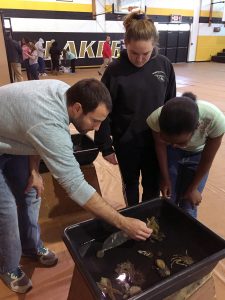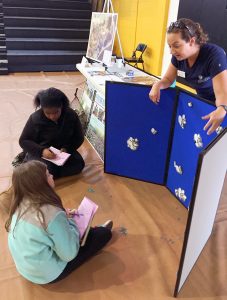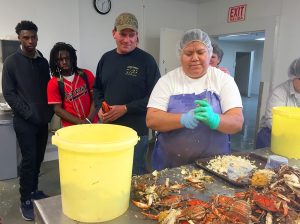Despite the low hum of an early morning crowd of students, one question resonated throughout the gymnasium: How many of you have a relative in the seafood industry? Dozens of eager hands readily shot up in reply.
Thinking about a future career can be stressful, especially for students in rural areas where many choices involve leaving home for the first time, and potentially, for good. But many students in North Carolina are not even aware of the growing opportunities right in their own backyards.
To highlight emerging careers in the aquaculture and seafood industries, North Carolina Sea Grant collaborated with Mattamuskeet Early College High School to hold an education and career exploration day with local experts. Part of the N.C. Science Festival, the April 13 event offered presentations and hands-on activities to encourage students to look more closely at an industry many of them have been surrounded by their entire lives.

Jane Harrison, a coastal economist for Sea Grant, speaks to middle- and high-school students at Mattamuskeet Early College High School about the county’s aquaculture and seafood industries. Photo by Diana Hackenburg.
“When Sea Grant sent me information about how they wanted to do a presentation for students, I was very interested,” explains Jennifer Cahoon, an agricultural sciences teacher at the school — and driving force behind the event.
“Fishing and aquaculture are two of our main incomes in the community but many of our students don’t know much about the business end of things. Or they do know about it and feel that it is not relevant in their education, or as a career choice,” Cahoon reveals.

Students examined marine creatures like starfish and spider crabs under the supervision of Dave Cerino, aquaculture coordinator for Carteret Community College. Photo by Jane Harrison.
Middle- and high-school students listened attentively as Jane Harrison and Chuck Weirich of Sea Grant explained the basics of marine aquaculture and commercial fishing in the state. David Cerino of Carteret Community College’s aquaculture program followed with a look at related training and career opportunities, and Sherrie Carawan of Mattamuskeet Seafood capped off the initial presentations with the story of her family’s Hyde County-based business.
Students then dug deeper as each grade took turns visiting hands-on exhibits, answering questions as they proceeded — for prizes and a grade. Occasional squeals were not uncommon as students broke out of their comfort zones to pick up live marine critters like starfish and spider crabs provided by Cerino.
Several exhibits were devoted to the role of oysters in growing and sustaining an environmentally and economically healthy Hyde County. The N.C. Coastal Federation emphasized the importance of recycling oyster shells and restoring reefs while Sea Grant’s Weirich focused on the cultivation of oysters for harvest.

Students played a game led by Erica Connery, NC Coastal Federation, to learn about oyster ecology and habitat restoration. Photo by Jane Harrison.
GIS specialist Jenny Holder helped students connect these ideas by leading them through Sea Grant’s new oyster story map. “Maps help the students and the community as a whole better understand the environmental and resources already around them,” Holder explains. “Exposure to GIS also presents future opportunities in the technology industry that they may never have realized exist.”
In the afternoon, a smaller group of high-school agricultural students traveled just down the road for a tour of Mattamuskeet Seafood. The group marveled as workers expertly picked through crabs and shucked oysters while Carawan again linked their common local heritage to actual business opportunities.
Among the ideas students took away from the experience, one stood out to Cahoon. “The students actually learned about the different businesses in their community. They learned how important this industry is to where they live and how it can affect their well-being economically,” she surmised.

Students watched closely as workers processed crab during a tour of Mattamuskeet Seafood. Cory Carawan, third from left, owns and manages the company with his family. Photo by Jane Harrison.
The event received positive feedback from all involved. Even before the school bell rang, Kris Noble, director of the Hyde County Office of Planning and Economic Development, was encouraging a similar day be scheduled for Ocracoke students.
Additional event partners included Hyde County Cooperative Extension, the Hyde County Soil and Water Conservation District and Outer Banks Catch. Funding for the event was provided by Sea Grant through an internal competition to identify new outreach opportunities.
For more information about Sea Grant’s work in aquaculture and the seafood industry, please contact Jane Harrison, a coastal economist with North Carolina Sea Grant, at jane_harrison@ncsu.edu.